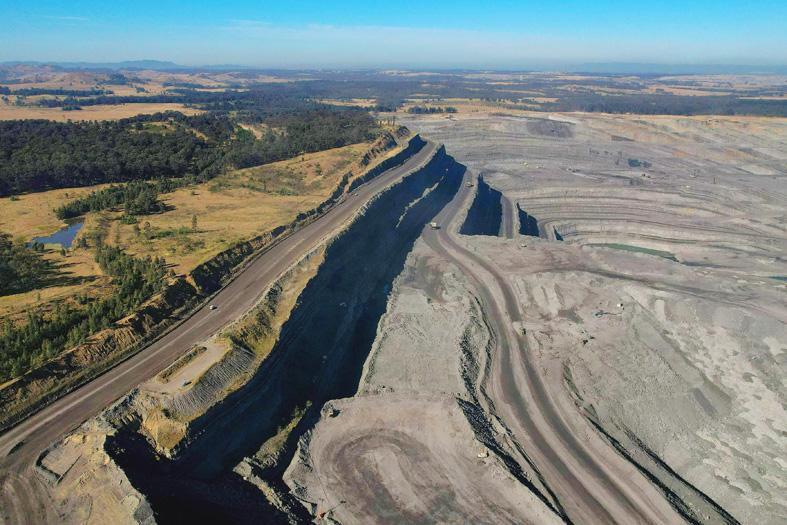Switzerland-based mining and commodity trading giant Glencore PLC has agreed to supply coal to a Japanese customer at one of the highest prices ever paid by the nation, threatening to further accelerate inflation.
Nippon Steel Corp agreed on a supply deal through March next year with Glencore for power plant coal at US$375 per tonne, said people with knowledge of the deal who asked not to be identified because the information is private.
The agreement is three times more expensive than similar deals struck last year and is likely one of the costliest coal contracts ever signed by a Japanese company, one of the people said.

Photo: Reuters
Spokespeople for Glencore and Nippon Steel declined to comment.
Global competition for coal and natural gas is escalating as power generators move to secure additional fuel shipments amid an energy crunch.
Utilities are curbing imports from Russia due to Moscow’s war in Ukraine, tightening the amount of available supply and sending prices surging.
Japan has been struggling with strained electricity supplies and high demand during a heat wave over the past few weeks.
Nippon Steel, which uses fuel to power its industrial sites and supplies electricity to Japan’s grid, earlier this month purchased the country’s most expensive ever natural gas shipment.
Glencore is the world’s top coal shipper, and profits from the power plant fuel are at an all-time high.
The resource giant is on course for a record year as it cashes in on soaring prices and volatility.
The Glencore deal might be used as the benchmark price for other annual supplies by thermal coal users in Asia, the people said.
That would boost the cost to generate electricity, and threaten to increase power bills for businesses and households.
Australian Newcastle coal futures closed at US$410.45 per tonne on Tuesday on ICE Futures Europe, after setting a record earlier this year.
European coal futures for next year rallied to an all-time high on Tuesday as Russia threatens to curb gas supplies to the continent.
Separately, Rio Tinto Group reported a sharp decline in profits in the first half of the year and cut its dividend in half, in the latest sign that a bonanza era of record returns across the mining industry is nearing an end.
A year earlier, the world’s biggest producers were enjoying supersized returns, after key commodities such as iron ore and copper surged.
Now, profit margins are being squeezed as recessionary worries drive prices lower while costs across the sector are ballooning.
Rio reported underlying earnings of US$8.6 billion in the first half, missing the average analyst estimate and down from a record US$12.2 billion last year.
The company is planning to pay a US$4.3 billion dividend compared with US$9.1 billion it returned a year earlier.

SEMICONDUCTORS: The firm has already completed one fab, which is to begin mass producing 2-nanomater chips next year, while two others are under construction Taiwan Semiconductor Manufacturing Co (TSMC, 台積電), the world’s largest contract chipmaker, plans to begin construction of its fourth and fifth wafer fabs in Kaohsiung next year, targeting the development of high-end processes. The two facilities — P4 and P5 — are part of TSMC’s production expansion program, which aims to build five fabs in Kaohsiung. TSMC facility division vice president Arthur Chuang (莊子壽) on Thursday said that the five facilities are expected to create 8,000 jobs. To respond to the fast-changing global semiconductor industry and escalating international competition, TSMC said it has to keep growing by expanding its production footprints. The P4 and P5

DOWNFALL: The Singapore-based oil magnate Lim Oon Kuin was accused of hiding US$800 million in losses and leaving 20 banks with substantial liabilities Former tycoon Lim Oon Kuin (林恩強) has been declared bankrupt in Singapore, following the collapse of his oil trading empire. The name of the founder of Hin Leong Trading Pte Ltd (興隆貿易) and his children Lim Huey Ching (林慧清) and Lim Chee Meng (林志朋) were listed as having been issued a bankruptcy order on Dec. 19, the government gazette showed. The younger Lims were directors at the company. Leow Quek Shiong and Seah Roh Lin of BDO Advisory Pte Ltd are the trustees, according to the gazette. At its peak, Hin Leong traded a range of oil products, made lubricants and operated loading

The growing popularity of Chinese sport utility vehicles and pickup trucks has shaken up Mexico’s luxury car market, hitting sales of traditionally dominant brands such as Mercedes-Benz and BMW. Mexicans are increasingly switching from traditionally dominant sedans to Chinese vehicles due to a combination of comfort, technology and price, industry experts say. It is no small feat in a country home to factories of foreign brands such as Audi and BMW, and where until a few years ago imported Chinese cars were stigmatized, as in other parts of the world. The high-end segment of the market registered a sales drop

Citigroup Inc and Bank of America Corp said they are leaving a global climate-banking group, becoming the latest Wall Street lenders to exit the coalition in the past month. In a statement, Citigroup said while it remains committed to achieving net zero emissions, it is exiting the Net-Zero Banking Alliance (NZBA). Bank of America said separately on Tuesday that it is also leaving NZBA, adding that it would continue to work with clients on reducing greenhouse gas emissions. The banks’ departure from NZBA follows Goldman Sachs Group Inc and Wells Fargo & Co. The largest US financial institutions are under increasing pressure